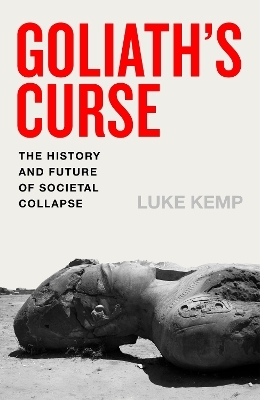
Goliath’s Curse
The History and Future of Societal Collapse
Seiten
2025
Viking (Verlag)
978-0-241-74124-5 (ISBN)
Viking (Verlag)
978-0-241-74124-5 (ISBN)
- Noch nicht erschienen (ca. Juli 2025)
- Versandkostenfrei innerhalb Deutschlands
- Auch auf Rechnung
- Verfügbarkeit in der Filiale vor Ort prüfen
- Artikel merken
A radical retelling of human history through collapse – from the dawn of our species to the urgent existential threats of the twentieth-first century and beyond – based on the latest research on the last 5,000 years and more than 440 societal lifespans.
Why do civilisations collapse? Is human progress possible? Are we approaching our endgame?
For the first 200,000 years, hunter-gathering homo sapiens lived in egalitarian, democratic groups and successfully thwarted any individual or group from ruling permanently. Then, around 12,000 years ago, that began to change.
People became increasingly reliant on resources like grain and fish, and if the landscape was caged small groups began to seize control of these resources. Slowly, hesitantly we began to organise ourselves into hierarchies. And as inequalities and hierarchies rose, so too did war: we didn’t just pick up the plough but also the sword. Neighbours now had a model to emulate, as states and empires rose and carved up the world. In every case, it was the curse of rampant inequality, extractive institutions, corruption and over-expansion that brought these Goliaths crashing down: from Ancient Rome to the British Empire.
Now we live in a single global Goliath. Growth-obsessed, extractive institutions like the fossil fuel industry, big tech and military-industrial complexes rule our world. Our ever faster, more interconnected systems exacerbate the severity of our fall: from economic collapse to nuclear war and climate disaster. Now, all of us faces a choice: we must learn to democratically control Goliath, or we may face a final collapse.
‘Brilliant and insightful . . . guaranteed to keep you thinking during the day and wide awake with worry during the night’ Eric Cline
‘This is the book on societal collapse that I had always hoped someone would write’ Walter Scheidel
Why do civilisations collapse? Is human progress possible? Are we approaching our endgame?
For the first 200,000 years, hunter-gathering homo sapiens lived in egalitarian, democratic groups and successfully thwarted any individual or group from ruling permanently. Then, around 12,000 years ago, that began to change.
People became increasingly reliant on resources like grain and fish, and if the landscape was caged small groups began to seize control of these resources. Slowly, hesitantly we began to organise ourselves into hierarchies. And as inequalities and hierarchies rose, so too did war: we didn’t just pick up the plough but also the sword. Neighbours now had a model to emulate, as states and empires rose and carved up the world. In every case, it was the curse of rampant inequality, extractive institutions, corruption and over-expansion that brought these Goliaths crashing down: from Ancient Rome to the British Empire.
Now we live in a single global Goliath. Growth-obsessed, extractive institutions like the fossil fuel industry, big tech and military-industrial complexes rule our world. Our ever faster, more interconnected systems exacerbate the severity of our fall: from economic collapse to nuclear war and climate disaster. Now, all of us faces a choice: we must learn to democratically control Goliath, or we may face a final collapse.
‘Brilliant and insightful . . . guaranteed to keep you thinking during the day and wide awake with worry during the night’ Eric Cline
‘This is the book on societal collapse that I had always hoped someone would write’ Walter Scheidel
Luke Kemp is a research associate at the Centre for the Study of Existential Risk at the University of Cambridge. He has a background in human geography, international relations and economics, all of which he tutored or lectured in at the Australian National University (ANU). His research has been covered by media outlets such as the New York Times, the BBC and the New Yorker.
| Erscheint lt. Verlag | 3.7.2025 |
|---|---|
| Verlagsort | London |
| Sprache | englisch |
| Maße | 153 x 234 mm |
| Gewicht | 700 g |
| Themenwelt | Geschichte ► Allgemeine Geschichte ► Altertum / Antike |
| Sozialwissenschaften ► Politik / Verwaltung ► Europäische / Internationale Politik | |
| Wirtschaft ► Volkswirtschaftslehre ► Finanzwissenschaft | |
| ISBN-10 | 0-241-74124-6 / 0241741246 |
| ISBN-13 | 978-0-241-74124-5 / 9780241741245 |
| Zustand | Neuware |
| Informationen gemäß Produktsicherheitsverordnung (GPSR) | |
| Haben Sie eine Frage zum Produkt? |
Mehr entdecken
aus dem Bereich
aus dem Bereich
von den Anfängen bis zur Spätantike
Buch | Softcover (2024)
C.H.Beck (Verlag)
12,00 €


